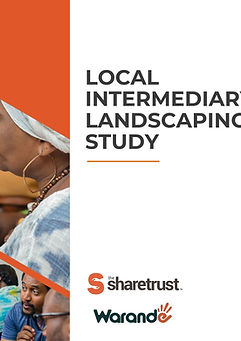
Publications
Explore our growing library of reports, publications, research briefs, and evidence-based insights. This section offers in-depth analysis, lessons from the field, and thought leadership that inform and inspire locally-led development, systems change, and equitable funding practices.
.jpeg)
Local Intermediary Landscaping Study
As global aid budgets tighten, local intermediaries provide a cost-efficient and community-rooted way to channel support - delivering aid 32% more efficiently than international actors. But donors need to know who these local intermediaries are to fund them effectively. Our Local Intermediary Landscaping Study bridges this gap, helping funders connect international resources with locally led action. Explore and share the report to empower local actors.

Empowering Local Voices: A Transboundary Forum for Equitable Development
From the 2nd of September until the 4th of September 2024, the Warande Advisory Centre (WAC) and The Share Trust (TST) organised and hosted a three-day forum in Nairobi, uniting local coalition representatives from Kenya, Uganda, Ethiopia, Bangladesh, and Nigeria. This event aimed to foster cross-border collaboration, providing a platform for participants to exchange experiences, address challenges, and strategise on empowering local actors....

What does localization really mean?
.jpg)
Whose Risk? A Collaborative Path to Inclusive Due Diligence
At the Global Philanthropy Forum 2025, our breakout session, "Whose Risk? A Collaborative Path to Inclusive Due Diligence," delved into the evolving dynamics of risk in philanthropy. Funders often speak of risk in financial, legal and reputational terms. However, for civil society organizations (CSOs), risk can be about survival — ensuring that they can continue to serve communities despite compliance burdens, shifting donor priorities and political challenges.

Valuing and Sharing Local Knowledge and Capacity Paper

Supporting local intermediaries through the Local Coalition Accelerator Model
The Share Trust and Warande Advisory Centre initiated the Local Coalition Accelerator (LCA) model, which brings together local and national organisations to form coalitions that co-create solutions supporting locally led development...





.png)




